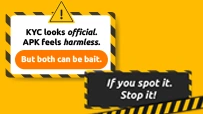Understanding the RTGS Refund Process for Failed Transactions
Disclaimer: Ujjivan Small Finance Bank is not responsible for the accuracy of the information provided herein. The blog is written for generic information.
July 05, 2025

We've all experienced the frustration of a transaction error wile transferring funds at some point in our lives. Whether it's a failed online payment or an incorrect fund transfer, these situations can leave us feeling helpless. But fear not! The Reserve Bank of India (RBI) has laid down specific guidelines for banks to follow when it comes to the RTGS refund process for failed transactions. These guidelines ensure that customers are protected and their money is safe.
In this article, we'll demystify the RTGS refund process and guide you through resolving transaction errors.
Reasons for Failed Transactions Through RTGS
RTGS (Real Time Gross Settlement) transactions can fail for several reasons, leading to refunds. Here are the primary causes for RTGS transaction errors.
1. Incorrect Beneficiary Details
If the remitter provides incorrect account numbers or IFSC codes, the beneficiary bank cannot credit the funds.
2. Non-Existence of Beneficiary Account
If the beneficiary's account is closed or frozen due to legal issues, the transaction cannot be completed.
3. Technical Issues
Technical glitches at either the remitting or beneficiary bank can disrupt the transaction process.
4. Compliance Issues
Transactions may be blocked due to compliance checks related to anti-money laundering regulations or other legal requirements.
5. Insufficient Funds
If the beneficiary's account has restrictions that prevent crediting, such as insufficient balance or limits on incoming transfers, the transaction may fail.
6. Network Problems
Disruptions in internet connectivity or banking network outages can prevent successful completion of transactions.
7. Time Constraints
If a transaction is initiated close to the end of the RTGS business day, it may not be processed in time, leading to a refund.
8. Bank Policies
Some banks may have specific rules that affect how and when transactions are processed, potentially leading to delays or failures.
How to Initiate the RTGS Refund Process?
The refund process for failed Real Time Gross Settlement transactions is governed by guidelines set by the Reserve Bank of India (RBI). Here’s a detailed overview of how this process works, including timelines, compensation, and steps to take if issues arise.
1. Timeline for Refunds
- Immediate Return: If the beneficiary's bank cannot credit the funds to the beneficiary's account for any reason, it must return the funds to the originating bank within one hour of receipt of the payment message at the Payment Interface (PI) or before the end of the RTGS business day, whichever comes first.
- Credit to Remitter's Account: Once the originating bank receives the returned funds, it is obligated to reverse the original debit entry in the remitter's account promptly.
2. Compensation for Delays
In cases where there is a delay in returning the failed payment, the originating customer is entitled to compensation. This is calculated as follows:
- Compensation Rate: The compensation is at the current RBI repo rate plus an additional 2%. As of now, with a repo rate of 6.50%, this totals 8.50% per annum for the period of delay.
3. Steps to Take if Issues Arise
- Contact Your Bank: If a transaction fails or there is a delay in crediting funds, customers should first contact their bank's customer service or visit their branch with details of the transaction, including the Unique Transaction Reference (UTR) number.
- Escalation Process: If the issue remains unresolved after 30 days, customers can escalate their complaint under "The Reserve Bank-Integrated Ombudsman Scheme (RB-IOS, 2021)". This scheme provides a structured mechanism for addressing grievances related to RBI-regulated entities.
| Aspect | Details |
| Refund Timeframe | Within 1 hour or by end of RTGS business day |
| Compensation Rate | Current repo rate + 2% (Total: 8.50% currently). May change if RBI cuts or increases repo rates. |
| Initial Contact | Bank's customer service or branch |
| Escalation Contact | Reserve Bank-Integrated Ombudsman Scheme |
Understanding these processes ensures that customers are well-informed about their rights and remedies regarding failed RTGS transactions.
Final Thoughts
In conclusion, the RTGS refund process ensures that you are protected in case of transaction errors. By understanding the common types of errors and following the necessary steps, you can resolve these issues effectively.
Enjoy easy banking with Ujjivan Small Finance Bank. Save more with our high-interest Savings Account and Deposit products. Need cash for your business or personal needs? Apply for MSME Loans or Micro Loans with us – we offer competitive rates and quick disbursal. We also offer vehicle loans and home loans tailored for your unique requirements. Experience a smooth banking journey with Ujjivan SFB!
Disclaimer:
The contents herein are only for informational purposes and generic in nature. The content does not amount to an offer, invitation or solicitation of any kind to buy or sell, and are not intended to create any legal rights or obligations. This information is subject to updation, completion, amendment and verification without notice. The contents herein are also subject to other product-specific terms and conditions, as well as any applicable third-party terms and conditions, for which Ujjivan Small Finance Bank assumes no responsibility or liability.
Nothing contained herein is intended to constitute financial, investment, legal, tax, or any other professional advice or opinion. Please obtain professional advice before making investment or any other decisions. Any investment decisions that may be made by the you shall be at your own sole discretion, independent analysis and evaluation of the risks involved. The use of any information set out in this document is entirely at the user’s own risk. Ujjivan Small Finance Bank Limited makes no representation or warranty, express or implied, as to the accuracy and completeness for any information herein. The Bank disclaims any and all liability for any loss or damage (direct, indirect, consequential, or otherwise) incurred by you due to use of or due to investment, product application decisions made by you on the basis of the contents herein. While the information is prepared in good faith from sources deemed reliable (including public sources), the Bank disclaims any liability with respect to accuracy of information or any error or omission or any loss or damage incurred by anyone in reliance on the contents herein, in any manner whatsoever.
To know more about Ujjivan Small Finance Bank Products Visit:"https://www.ujjivansfb.in"
All intellectual property rights, including copyrights, trademarks, and other proprietary rights, pertaining to the content and materials displayed herein, belong
to Ujjivan Small Finance Bank Limited or its licensors. Unauthorised use or misuse of any intellectual property, or other content displayed herein is strictly prohibited and the same is not intended for distribution to, or use by, any person in any jurisdiction where such distribution or use would (by reason of that person’s nationality, residence or otherwise) be contrary to law or registration or would subject Ujjivan Small Finance Bank Limited or its affiliates to any licensing or registration requirements.
FAQs
1. What is an RTGS refund?
An RTGS refund is a process by which funds are returned to the sender in case of a failed or erroneous RTGS transaction.
2. How long does it take to get an RTGS refund?
The time taken for an RTGS refund varies depending on the bank policies and procedures. It generally should be resolved in a few days.
3. Can I dispute a transaction error if my bank denies my claim for a refund?
Yes, you have the option to escalate your complaint if your bank denies your claim for a refund. Contact higher authorities within the bank or approach the banking ombudsman for assistance.
4. What are the minimum and maximum amounts for RTGS?
Minimum Amount: The minimum amount that can be transferred via RTGS is ₹2,00,000.Maximum Amount: There is no upper limit on the amount that can be transferred through RTGS.
5. Do bank policies govern the RTGS refund process?
In several areas of the RTGS refund process we do not see bank policies, but the RBI setting the norms. These include refund guidelines, timelines for refund, compensation rate in case of delays etc.
6. Can I request a refund directly from the receiving bank?
No, you should contact your own bank for any transaction error or refund-related issues. They will coordinate with the receiving bank if required.
7. What should I do if I encounter a transaction error through RTGS?
Contact your bank immediately and provide them with all relevant details. They will initiate an investigation to resolve the issue and process a refund if necessary.
8. What are the operational hours for RTGS?
RTGS services are available 24/7, including weekends and holidays, since December 2020. However, offline transactions at bank branches may have specific operational hours.
9. How can I ensure that I enter accurate details for an RTGS transfer?
Double-check all recipient details, including the account number and IFSC code, before initiating an RTGS transfer.
10. Are there any charges associated with RTGS transactions?
Yes, there are charges associated with RTGS transactions. These charges vary from bank to bank.
Latest Blogs

Dussehra 2025: How to Win Your Financial Battles with Smart Saving
Dussehra 2025 (also known as Vijayadashami) falls on Thursday, October 2, 2025.

eSIM Scam in India: I4C Warns Mobile Users About Rising Fraud – How to Stay Safe
The Indian Cybercrime Coordination Centre (I4C), a wing of the Ministry of Home Affairs, issued a strong warning to mobile users about the rapid increase in eSIM fraud in India.

How to Link PAN with Aadhaar: Step-by-Step Guide & Consequences of Not Linking
Linking your Permanent Account Number (PAN) with your Aadhaar is no longer just a best practice.

Annual Information Statement (AIS): A Complete Guide for Stress-Free ITR Filing
India’s tax season is in its final stretch.

ITR-1 (Sahaj) Restrictions: Income Sources Not Allowed & Filing Rules
With just a few days left before the 15 September 2025 deadline for filing Income Tax Returns (ITRs) for Assessment Year (AY) 2025-26, many taxpayers are rushing to submit their forms online.





